Renewable Energy Development Zones
REDZs refer to geographical areas where wind and solar PV development can occur in concentrated zones, which will lead to:
-
a reduction of negative environmental consequences;
-
alignment of authorisation and approval processes;
-
attractive incentives; and
-
focused expansion of the South African electricity grid.
Cabinet further stated that the REDZs will, among others, accelerate infrastructure development and contribute in creating a “predictable regulatory framework that reduces bureaucracy related to the cost of compliance”.
The Department of Environmental Affairs’ media statement issued in respect of the approved gazetting of the REDZs provided that eight REDZs and five Power Corridors have been identified. The gazetting of these areas means that projects within these areas will now only be subject to a Basic Assessment and not a full Environmental Impact Assessment (EIA) process. This change will accelerate the assessment process, as scoping level pre-assessments would have been undertaken. As such an application for an Environmental Authorisation should be completed in 147 days, instead of 300 days.
The Council for Scientific and Industrial Research (CSIR) identified the following eight geographic areas for REDZ following a Strategic Environmental Assessment (SEA):
Currently one of the greatest challenges of South African renewable energy development is constraints on grid infrastructure, and the resulting timelines for and costs of grid expansion. The REDZs are anticipated to aid the future bidding rounds of the Renewable Energy Independent Power Producer Procurement Programme (REIPPPP) by allowing for focused grid development and an alignment of approval processes in the REDZs. To date the REIPPPP has led to the procurement of 7000 MW of renewable capacity across 92 projects.
The information and material published on this website is provided for general purposes only and does not constitute legal advice. We make every effort to ensure that the content is updated regularly and to offer the most current and accurate information. Please consult one of our lawyers on any specific legal problem or matter. We accept no responsibility for any loss or damage, whether direct or consequential, which may arise from reliance on the information contained in these pages. Please refer to our full terms and conditions. Copyright © 2026 Cliffe Dekker Hofmeyr. All rights reserved. For permission to reproduce an article or publication, please contact us cliffedekkerhofmeyr@cdhlegal.com.
Subscribe
We support our clients’ strategic and operational needs by offering innovative, integrated and high quality thought leadership. To stay up to date on the latest legal developments that may potentially impact your business, subscribe to our alerts, seminar and webinar invitations.
Subscribe




